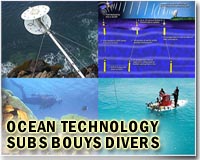 |
Bronx NY (SPX) Aug 20, 2010 The Wildlife Conservation Society has released initial field observations that indicate that a dramatic rise in the surface temperature in Indonesian waters has resulted in a large-scale bleaching event that has devastated coral populations. WCS's Indonesia Program "Rapid Response Unit" of marine biologists was dispatched to investigate coral bleaching reported in May in Aceh-a province of Indonesia-located on the northern tip of the island of Sumatra. The initial survey carried out by the team revealed that over 60 percent of corals were bleached. "Bleaching"- a whitening of corals that occurs when algae living within coral tissues are expelled - is an indication of stress caused by environmental triggers such as sea surface temperature fluctuations. Depending on many factors, bleached coral may recover over time or die. Subsequent monitoring conducted by marine ecologists from WCS, James Cook University (Australia), and Syiah Kuala University (Indonesia) were completed in early August and revealed one of the most rapid and severe coral mortality events ever recorded. The scientists found that 80 percent of some species have died since the initial assessment and more colonies are expected to die within the next few months. The event is the result of a rise in sea surface temperatures in the Andaman Sea - an area that includes the coasts of Myanmar, Thailand, the Andaman and Nicobar Island, and northwestern Indonesia. According to the National Oceanic and Atmospheric Administration's Coral Hotspots website, temperatures in the region peaked in late May of 2010, when the temperature reached 34 degrees Celsius-4 degrees Celsius higher than long term averages for the area. "It's a disappointing development particularly in light of the fact that these same corals proved resilient to other disruptions to this ecosystem, including the Indian Ocean Tsunami of 2004," said WCS Indonesia Marine Program Director Dr. Stuart Campbell. WCS and JCU have been working in the region since March 2005. Surveys conducted in the wake of the Indian Ocean Tsunami in 2004 revealed that the many reefs of Aceh were largely unaffected by this massive disturbance. Indeed, reefs severely damaged by poor land use and destructive fishing prior to the tsunami had recovered dramatically in the intervening years due to improved management. Government and community-managed areas in the region have been remarkably successful at maintaining fish biomass despite ongoing access to the reefs. But the bleaching and mortality in 2010 have rapidly reversed this recovery and will have a profound effect on reef fisheries. Of particular concern is the scale of the sea surface temperature anomaly which the NOAA website indicates has affected the entire Andaman Sea and beyond. Similar mass bleaching events in 2010 have now been recorded in Sri Lanka, Thailand, Malaysia and many parts of Indonesia. "If a similar degree of mortality is apparent at other sites in the Andaman Sea this will be the worst bleaching event ever recorded in the region," according to Dr. Andrew Baird of the ARC Centre of Excellence for Coral Reef Studies at JCU. "The destruction of these upstream reefs means recovery is likely to take much longer than before". "This is a tragedy not only for some of the world's most biodiverse coral reefs, but also for people in the region, many of whom are extremely impoverished and depend on these reefs for their food and livelihoods," said WCS Marine Program Director Dr. Caleb McClennen. "Immediate and intensive management will be required to try and help these reefs, their fisheries and the entire ecosystem recover and adapt. However, coral reefs cannot be protected from the warming ocean temperatures brought on by a changing climate by local actions alone. This is another unfortunate reminder that international efforts to curb the causes and effects of climate change must be made if these sensitive ecosystems and the vulnerable human communities around the world that depend on them are to adapt and endure."
Share This Article With Planet Earth
Related Links Wildlife Conservation Society Water News - Science, Technology and Politics
 US researchers create frozen coral 'bank' to protect species
US researchers create frozen coral 'bank' to protect speciesWashington (AFP) Aug 18, 2010 US scientists have created the first bank of frozen coral cells, intended to preserve endangered coral species in Hawaii and protect their diversity. The bank so far contains frozen sperm and embryonic cells from mushroom coral and rice coral, but researchers say they plan to expand the cell library to include more of Hawaii's coral species. "Because frozen banked cells are viable, the f ... read more |
|
| The content herein, unless otherwise known to be public domain, are Copyright 1995-2010 - SpaceDaily. AFP and UPI Wire Stories are copyright Agence France-Presse and United Press International. ESA Portal Reports are copyright European Space Agency. All NASA sourced material is public domain. Additional copyrights may apply in whole or part to other bona fide parties. Advertising does not imply endorsement,agreement or approval of any opinions, statements or information provided by SpaceDaily on any Web page published or hosted by SpaceDaily. Privacy Statement |